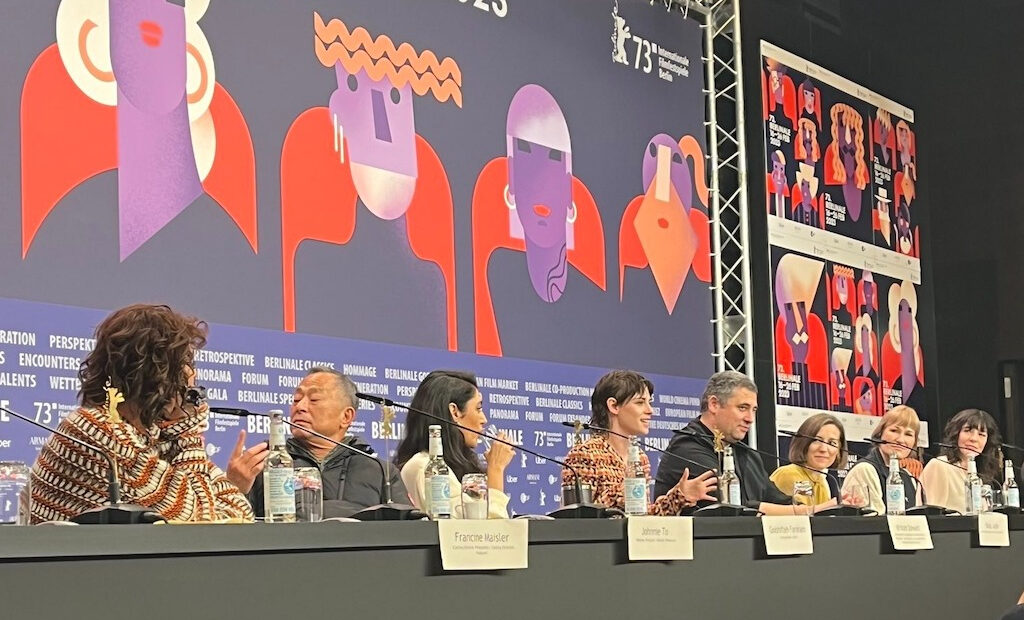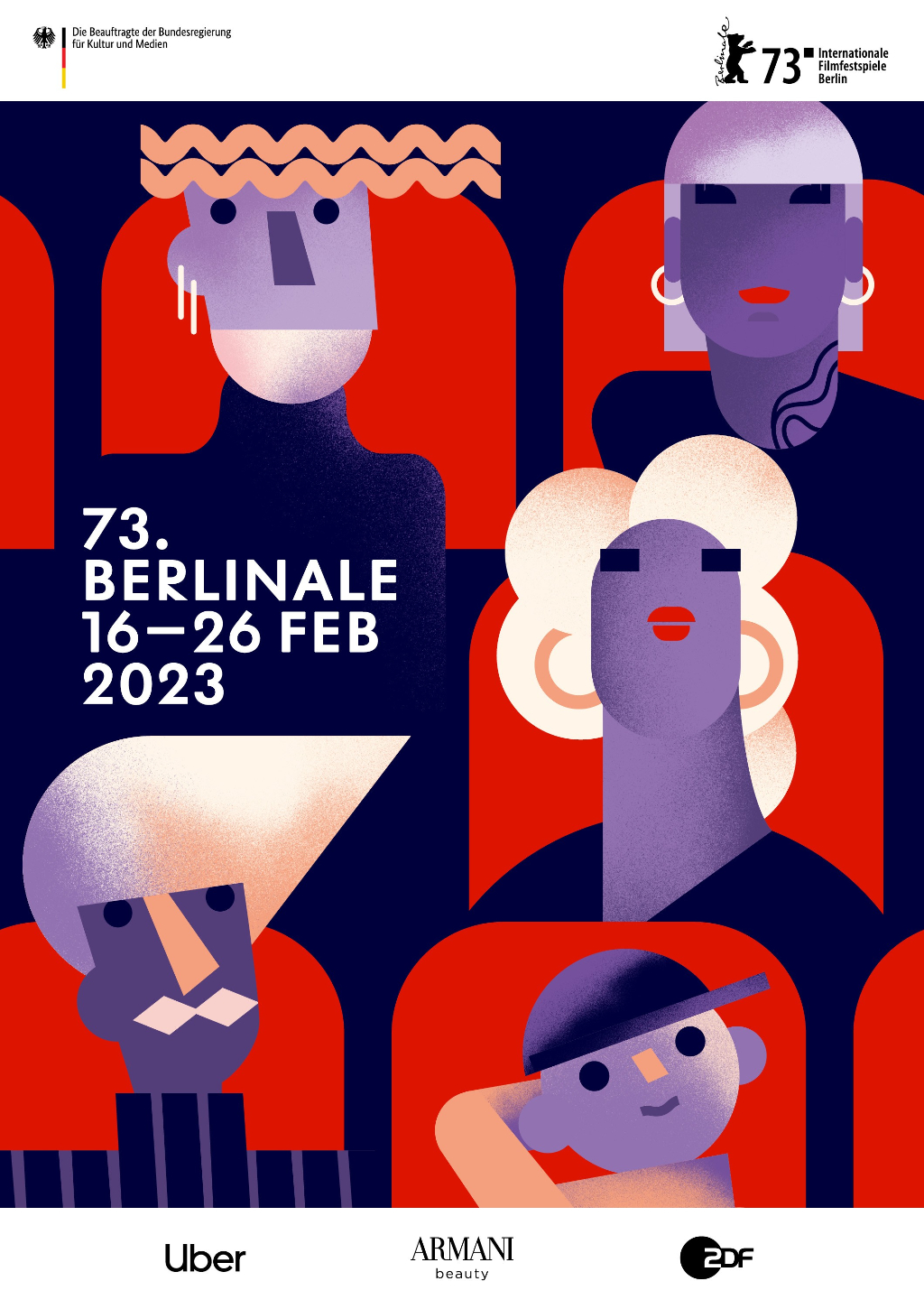“Culture is a fire we can all gather around”: The international jury meet for the start of Berlin Film Festival 2023

It’s Thursday morning in Berlin and, en route to the Grand Hyatt where the opening press conference is held, the conglomerate of fans, professional autograph hunters and paparazzi waiting at the hotel’s side entrance can already be made out in the distance. Inside, the room is bustling: the best seats have been snatched up, there are no assigned spots, no distancing, only one or two journalists wear masks. The only indication that the previous three editions of the festival were affected by a global pandemic is that the long table is wiped down with disinfectant once more before the members of the jury take their positions.
As usual, photographers storm the first rows; keen to get the best shots, they step on a few toes, crashing into laptops and members of security. “Sit down, calm down,” they are finally told, and some ensconce themselves right where they stand, their feet creeping underneath the barrier. It’s precisely the “back to normal” vibe for film festivals that many have longed for.
Of course the first question is for Kristen Stewart: “How does it feel to be here as the jury president?”
She spreads her hands, “In full transparency, I’m kind of shaking.” She is quick to point out that she is bolstered by the other members of the jury and that she is “ready to be changed by all the films and people.”
The next query addresses the group – whether there are any contemporary filmmakers whose work they follow. The top talent is somewhat hesitant to answer, and Stewart finally leans towards the microphone inviting the press to unpack the libraries of the people sitting next to her. In her lovably awkward manner, she apologises for not having a stock of filmmakers to list.
Director Johnnie To admits that he does not consider the films released today to be as good as the ones that came before, but he is hopeful for the future: films have to be daring! Asked what makes a piece worthy of a prize such as the ones they will hand out in just over a week, the panel points out that it’s subjective, of course: “We could find that we absolutely hate a film, but that the accomplishment is staggering,” Stewart suggests. The reason festivals exist is not only to celebrate one another, but to be open to the experience of something new. Historically, she adds, the Berlinale has always been – “in a positive way!” – confrontational and political. It’s important to be able to deprogram, to be fully open to newness and a breadth of perspectives, even if it may be strange to adapt to. “Pick the one that juts out! If we all can’t agree, that means it’s probably good.”
Iranian actress Golshifteh Farahani is asked about the political focus on her native country in this year’s lineup. “I came here in 2009 and it was a very different year,” she starts. Berlin is a symbolic city for her: the literal breaking down of a wall brought people together here. “This year, with Ukraine, with Iran, with the earthquake, it feels like the whole word is disintegrating.” These moments of transition show that art is not only a philosophical concept, but that it is essential: “Art and culture is a fire we can all gather [around] and warm ourselves up!”.
To thinks the reason why totalitarian governments are threatened by cinema, specifically, is its closeness to the public – the strong connection it has with the audience as it represents a large part of society. “If you want to fight for freedom, support cinema!”
The age-old question about the supposed death of cinema is being chuckled at. American casting director Francine Maisler, who has worked with a great number of legendary directors, points out their camaraderie when it comes to bringing people together and back into cinemas – how supportive they all were of Top Gun: Maverick.
Romanian filmmaker Radu Jude, who won the Golden Bear in 2021, quickly establishes himself as the class clown. He quotes the 1951 film Venom and Eternity, calling cinema the “industry of money and stupidity”. When the laughter dies down, he clarifies that while he does agree with the sentiment, a place like the Berlinale offers films with “less money and less stupidity”.
German director Valeska Grisebach likens her desire for cinema to a dark cave she likes to withdraw into, together with others, to make contact with the unknown. It is a place that needs nurturing, a societal and political commitment.
The last question is aimed at the jury members who not so long ago were on the opposite side of the competition: what does this award mean for a film? Incumbent Golden Bear winner Carla Simón shares that judging this year feels like a strange world to her. [As a filmmaker] “you never know where your film goes”, but once it is awarded a grand prize such as this, it definitely goes further. Radu Jude says he tries not to think about the honour of being the recipient of the award, so it doesn’t go to his head. The most important part and the real measure of success for him was that he was given the opportunity to make two more films in the wake of Bad Luck Banging or Loony Porn, because, he aptly closes the conference, especially in some parts of the world, “the question of making films is always at the edge of impossibility”.
Selina Sondermann
Berlin Film Festival runs from 16th until 26th February 2023.
Read reviews from our Berlin Film Festival 2023 coverage here.
For further information about the event visit the Berlin Film Festival website here.

























Facebook
Twitter
Instagram
YouTube
RSS